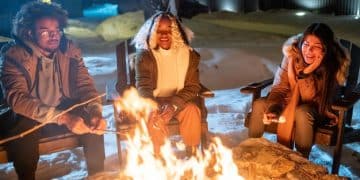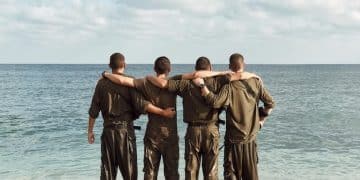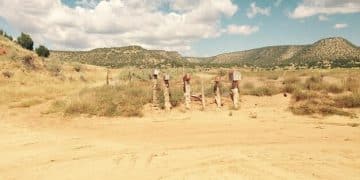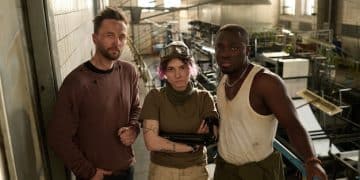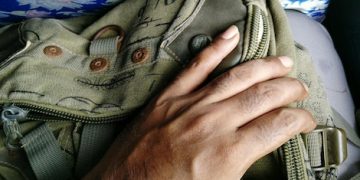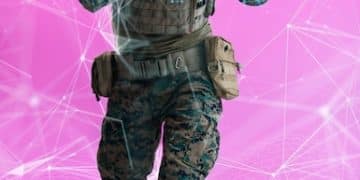How Military Culture Shapes Civilian Life in the US
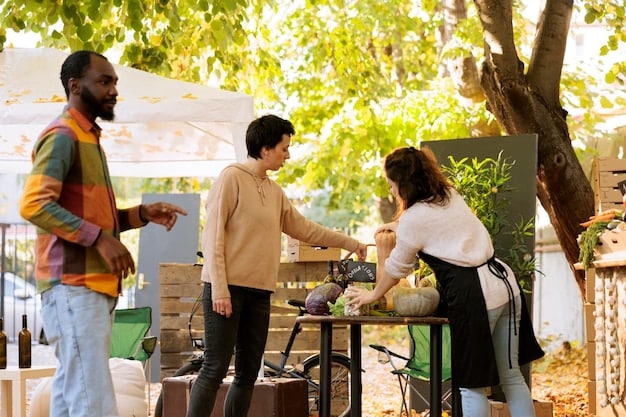
Military culture significantly influences civilian life in the US by instilling values such as discipline, leadership, and a strong sense of community, shaping approaches to work, civic engagement, and social interactions.
The military, a distinct subculture within the United States, profoundly shapes not only its members but also the broader civilian society. Understanding how military culture influences civilian life in the US requires examining the values, structures, and experiences that permeate the armed forces and how these translate into civilian contexts.
The Military Ethos: Values and Their Civilian Echoes
Military culture is built upon a foundation of core values, including honor, courage, commitment, and selfless service. These values are instilled through rigorous training and are expected to guide behavior both on and off duty. But how do these values resonate in civilian life?
Discipline and Work Ethic
One of the most transferable aspects of military culture is discipline. Service members are trained to follow orders, adhere to schedules, and maintain a high level of personal accountability. This discipline often translates into a strong work ethic in civilian jobs.
Veterans are often seen as reliable, punctual, and capable of handling pressure. Their ability to prioritize tasks and work efficiently makes them valuable assets in various industries.
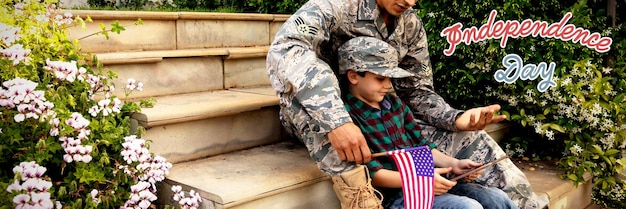
Leadership and Teamwork
Military culture emphasizes leadership at all levels. Even junior enlisted personnel are expected to take initiative and lead small teams. This experience fosters leadership skills that are highly sought after in the civilian world.
- Effective Communication: Military training often involves clear and concise communication, which is essential for effective leadership.
- Decision-Making Under Pressure: Service members learn to make quick decisions in stressful situations, a skill that translates well to management roles.
- Team Building: The military emphasizes teamwork and camaraderie, fostering the ability to build cohesive teams and motivate others.
Veterans often excel in leadership positions, bringing their experience in team building, communication, and decision-making to civilian organizations. Their ability to inspire and motivate others can significantly impact team performance.
In conclusion, the military ethos, characterized by discipline, leadership, and teamwork, has a profound impact on civilian life by shaping work ethics, leadership styles, and organizational dynamics.
The Structure and Hierarchy: Adapting to Civilian Organizations
The military operates within a highly structured and hierarchical system. This structure, while essential for command and control, also influences how veterans navigate civilian organizations. Understanding this influence helps bridge the gap between military and civilian work environments.
Respect for Authority
Military culture instills a deep respect for authority. Service members are trained to follow orders from superiors without question. This deference to authority can be both an asset and a challenge in civilian workplaces.
While respect for authority can contribute to a disciplined and efficient work environment, it can also clash with civilian cultures that value autonomy and open communication. Veterans may need to adapt their approach to authority to thrive in civilian organizations.
Chain of Command vs. Collaboration
The military’s strict chain of command contrasts with the more collaborative structures often found in civilian companies. Veterans may need to adjust their communication style and decision-making processes to align with civilian norms.
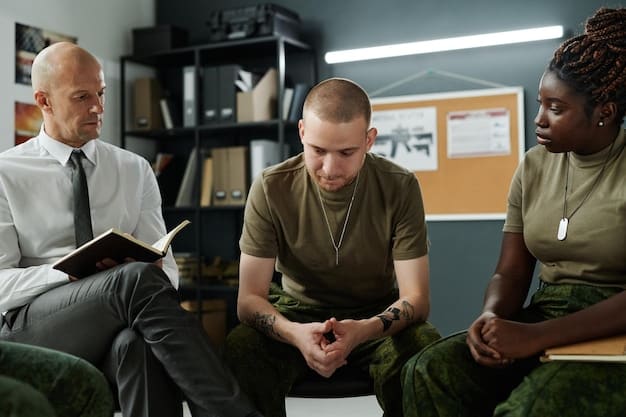
- Open Communication: Civilian organizations often encourage open communication and feedback between employees at all levels.
- Participative Decision-Making: Many civilian companies involve employees in decision-making processes, fostering a sense of ownership and engagement.
- Flexibility and Adaptability: Civilian workplaces often require greater flexibility and adaptability than military environments.
Veterans who can successfully adapt to these differences are well-positioned to succeed in civilian organizations. Their ability to work within a structured environment, combined with their leadership skills and work ethic, makes them valuable assets.
In summary, the structure and hierarchy inherent in military culture influence how veterans adapt to civilian organizations, requiring adjustments in their approach to authority, communication styles, and decision-making processes to thrive in collaborative civilian environments.
The Transition Experience: Challenges and Opportunities
Leaving the military and transitioning to civilian life is a significant life change. Veterans face unique challenges and opportunities as they navigate this transition. Understanding these challenges and leveraging the opportunities is crucial for a successful reintegration into civilian society.
Mental Health and Well-being
The experiences of military service, particularly combat deployments, can have lasting effects on mental health. PTSD, anxiety, and depression are common challenges faced by veterans. Access to quality mental health care is essential for their well-being.
Civilian society can support veterans by providing accessible mental health services, creating supportive communities, and raising awareness about the unique challenges they face.
Finding Purpose and Identity
Military service often provides a strong sense of purpose and identity. Veterans may struggle to find that same sense of purpose in civilian life. Finding meaningful work, volunteering, or engaging in community service can help fill this void.
Civilian organizations can support veterans by providing opportunities for leadership, teamwork, and service. Creating a sense of camaraderie and belonging can help veterans feel valued and connected.
Education and Employment
Education and employment are key factors in a successful transition to civilian life. Veterans often possess valuable skills and experience that are transferable to civilian jobs. However, they may need additional education or training to compete in the civilian job market.
Civilian society can support veterans by providing access to education and training programs, offering preferential hiring policies, and creating a welcoming and inclusive work environment.
In conclusion, the transition experience presents both challenges and opportunities for veterans re-entering civilian life, with mental health, purpose, and employment being key areas where support and understanding from civilian society are crucial for successful reintegration.
Community Engagement: Veterans as Civic Leaders
Veterans often bring their leadership skills, commitment to service, and sense of community to civic life. Their engagement in community organizations, non-profits, and local government can have a significant impact on civilian society. Exploring this engagement highlights how military culture fosters civic leadership.
Volunteering and Non-profit Work
Many veterans are drawn to volunteering and non-profit work. Their desire to continue serving others often leads them to organizations that address community needs. Veteran volunteers bring their unique skills and perspectives to these organizations.
Civilian communities benefit from the dedication and expertise of veteran volunteers. Their ability to lead, organize, and problem-solve makes them valuable assets to non-profit organizations.
Local Government and Politics
Veterans are increasingly involved in local government and politics. Their experience in leadership, decision-making, and public service makes them well-suited for these roles. Veteran politicians often bring a unique perspective to policy debates.
Civilian society benefits from the participation of veterans in local government. Their commitment to service and their understanding of community needs can lead to more effective and responsive governance.
Mentoring and Youth Development
Veterans often serve as mentors and role models for young people. Their experience in leadership, discipline, and character development makes them well-suited for this role. Veteran mentors can help young people develop the skills and values they need to succeed.
Civilian communities benefit from the involvement of veterans in youth development programs. Their ability to inspire and motivate young people can have a lasting impact on their lives.
In summary, veterans contribute significantly as civic leaders, engaging in volunteering, local government, and youth development, bringing valuable skills and a strong sense of community responsibility to various facets of civilian life.
The Influence on Popular Culture: Military Themes in Media
Military themes are prevalent in popular culture, shaping perceptions of military service and influencing civilian attitudes towards the armed forces. Examining this influence offers insights into how military culture is portrayed and understood in civilian society.
Film and Television
Film and television often depict military life, portraying both the heroism and the challenges of service. These portrayals can shape civilian perceptions of the military and influence attitudes towards war and conflict. The accuracy and nuance of these portrayals are important factors to consider.
Civilian society’s understanding of military culture is often shaped by film and television. These portrayals can either reinforce stereotypes or provide a more nuanced understanding of the complexities of military service.
Video Games
Video games often feature military themes, allowing civilians to experience simulated combat and military operations. These games can provide a sense of camaraderie and excitement, but they can also create a distorted view of war and violence.
- Realistic Simulations: Some video games strive to create realistic simulations of military operations, providing a glimpse into the challenges and complexities of combat.
- Heroic Narratives: Other video games focus on heroic narratives, portraying soldiers as brave and selfless heroes.
- Ethical Considerations: The portrayal of violence and the ethical implications of war are important considerations in video games with military themes.
Civilian attitudes towards the military can be influenced by video games. These games can either glorify war or provide a more nuanced understanding of the human cost of conflict.
Literature and Art
Literature and art often explore the themes of war, sacrifice, and the human cost of conflict. These works can provide a deeper understanding of the experiences of service members and the impact of military service on individuals and society.
Civilian society can benefit from engaging with literature and art that explores military themes. These works can foster empathy, understanding, and a greater appreciation for the sacrifices made by service members.
In conclusion, military themes in popular culture significantly influence civilian perceptions of military service, shaping attitudes towards war, heroism, and the realities faced by members of the armed forces.
Bridging the Gap: Fostering Understanding and Support
Creating a greater understanding between military and civilian cultures is essential for fostering support and ensuring a smooth transition for veterans. Exploring ways to bridge this gap can lead to stronger communities and a more inclusive society.
Education and Awareness
Education and awareness programs can help civilians understand the unique challenges and experiences of military service. These programs can dispel stereotypes, promote empathy, and foster a greater appreciation for the sacrifices made by service members.
Civilian communities can benefit from education and awareness programs that promote understanding and support for veterans. These programs can create a more welcoming and inclusive environment for veterans and their families.
Community Events and Initiatives
Community events and initiatives that bring together military and civilian populations can foster a sense of connection and shared purpose. These events can provide opportunities for dialogue, collaboration, and mutual support.
Civilian communities can strengthen their bonds with the military community by hosting events and initiatives that celebrate service, honor veterans, and promote understanding and camaraderie.
Supporting Veteran Organizations
Supporting veteran organizations is a tangible way to demonstrate appreciation for military service and provide resources for veterans in need. These organizations offer a wide range of services, including mental health care, job training, and housing assistance.
Civilian society can support veterans by donating to veteran organizations, volunteering their time, and advocating for policies that support veterans and their families.
In summary, bridging the gap between military and civilian cultures requires education, community engagement, and support for veteran organizations, fostering a more inclusive and understanding society that values the contributions of its service members.
| Key Aspect | Brief Description |
|---|---|
| 🫡 Core Military Values | Values like duty, honor, and courage impact personal and professional civilian life. |
| 💼 Workplace Contributions | Veterans often excel with discipline and leadership in civilian jobs. |
| 🫂 Community Roles | Veterans frequently engage in volunteering, civic duties, and mentoring. |
| 🎭 Cultural Impact | Military themes in media shape public perception and understanding. |
Frequently Asked Questions
▼
Military culture often fosters a strong work ethic, discipline, and leadership skills, which can positively influence workplace dynamics. Veterans are typically reliable, punctual, and adept at teamwork and problem-solving.
▼
Veterans may encounter challenges such as mental health issues (e.g., PTSD), difficulty finding purpose, and adapting to civilian workplace cultures. Access to support and resources is crucial for overcoming these obstacles.
▼
Civilian communities can support veterans by providing access to mental health services, creating inclusive work environments, offering educational opportunities, and recognizing their contributions through community events and initiatives.
▼
Veterans contribute significantly to civic life through volunteering, engaging in local government, mentoring youth, and participating in community organizations. Their leadership and commitment to service make them valuable assets.
▼
Popular culture often depicts military culture through films, TV shows, video games, and literature. These portrayals can shape civilian perceptions of military service, highlighting both the heroism and the challenges of military life.
Conclusion
The influence of military culture on civilian life in the US is multifaceted, impacting values, workplace dynamics, community engagement, and popular culture. Understanding this influence is essential for fostering support for veterans and bridging the gap between military and civilian societies, creating a more inclusive and appreciative nation.
